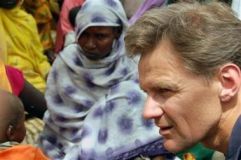six million face prospect of hopeless situation in Darfur -UN
Dec 6, 2006 (UNITED NATIONS) — The conflict in Sudan’s Darfur region has spread into neighboring Chad and the Central African Republic and is now in “free fall,” with the prospect of six million people in a hopeless situation without food or protection, the U.N. humanitarian chief said Tuesday in an Associated Press interview.
 Jan Egeland, who was the first to call Darfur the world’s worst humanitarian emergency in November 2003, said one of his greatest regrets is that key global leaders did not come together and offer the sticks and carrots to settle the conflict in 2004 when it only involved one million people.
Jan Egeland, who was the first to call Darfur the world’s worst humanitarian emergency in November 2003, said one of his greatest regrets is that key global leaders did not come together and offer the sticks and carrots to settle the conflict in 2004 when it only involved one million people.
“In the end, we only acted through the humanitarian way,” Egeland said in a farewell interview with the Associated Press before stepping down as undersecretary-general for humanitarian affairs on Dec. 12. “We have kept people alive, but we haven’t protected them, and as I’m going out, I regret to say we’re in a free fall again.”
The U.N. is evacuating its international staff and the assets it can at the moment because of the intensifying violence and insecurity, “but we’re not protecting the lives of the vulnerable women and children, and there are four times more of them now than when we started in 2004,” he said.
Egeland said one of the most difficult problems has been convincing countries of the dire situation in Darfur.
“I think some of the Arab countries and Asian countries have not really understood we’re in a free fall. It’s not a steady deterioration. It’s a free fall and it includes Darfur, eastern Chad, northern Central African Republic,” he said.
Where is the free fall going?
“We would get a genocide. We would get a Rwanda. We could get a terrible situation if the four million people who are in need of humanitarian assistance in Darfur is joined by a million people in Chad and another million in northern Central African Republic. That’s six million people in a totally hopeless situation,” Egeland said.
Egeland blamed the Sudanese government, parts of the rebel movement, ethnic leaders in Darfur, and the government of Chad for fueling the war, which began in 2003 when rebels from ethnic African tribes rose up against the Arab-led central government. Khartoum is accused of retaliating by unleashing the janjaweed militias of Arab nomads, and many rebel groups have joined the fight.
More than 200,000 people have been killed and 2.5 million displaced in the fighting, and the violence has only increased since the Sudanese government and one rebel group signed a peace agreement in May.
The U.N. humanitarian chief, who recently visited Darfur for the fourth time, said with the humanitarian operation folding in many places the women and children he met who thanked him for the food but pleaded for security will have nothing.
In a farewell speech on Monday to the U.N. Security Council, Egeland accused world leaders of failing to live up to a pledge made at a U.N. summit in September 2005 to protect civilians caught in armed conflict from genocide, war crimes and ethnic cleansing. A Security Council resolution adopted in April reaffirmed their agreement.
Egeland said he does not want a world police force led by one of the big powers to go into countries at gunpoint and try to protect civilians, because that could lead to an even worse situation.
“But what I do expect is that China, the United States, Russia, the European Union _ the leaders come together and say we’re going to push and pull and provide sticks and carrots until it changes,” he said.
“If we had had that for Darfur, from China to the United States and everything in between, we would have had a different situation,” Egeland said. “But there was never this kind of a coherent situation.”
Nonetheless, he said, things are starting to change.
China, which has close economic ties to Sudan, is now “actively engaged” but there are also many more armed groups bent on revenge killings, he said.
The Security Council adopted a resolution pushed by Britain and the United States to transfer peacekeeping in Darfur from an ill-equipped 7,000-member African Union force to a larger, better equipped U.N. force. But the Sudanese government rejected a U.N. force, claiming it would violate the country’s sovereignty and was an attempt at recolonization.
Egeland said the U.S. and Britain had the right idea — but what they should have known was that in the Arab and Islamic world people would look at the resolution and think of Iraq and the Israeli-Palestinian conflict. What was missing, he said, was support from African, Arab and Islamic countries for a U.N. force.
In late November, U.N. Secretary-General Kofi Annan said Sudan had agreed in principle to a compromise “hybrid mission” from the African Union and the U.N. — but Khartoum wanted to discuss the size, the force commander and the head of the overall mission.
“At the moment I think it’s more than sad to see that grown men with jackets and ties like me sit and quarrel of what is a `hybrid force’ … while women and children are dying,” Egeland said.
“I’m happy to note that in nine months we might have this force, but what about the next nine days where it could collapse completely?,” he asked.
(AP)
